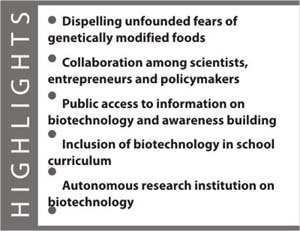Experts tell The Daily Star roundtable it can revolutionise farm, health sectors
Biotechnology holds an immense prospect for Bangladesh in the fields of agriculture and healthcare to meet the future challenges of food production and climate change.
However, lack of investment, research, and collaborative efforts among the entrepreneurs, scientists and policymakers stand in the way, said biotechnology experts at a roundtable yesterday.
The Daily Star organised the meeting on “Biotechnology in Bangladesh: Problems and Prospects” at its office in the city.
They said biotechnology could shape the country’s future by bringing a paradigm shift in healthcare, agriculture, energy, environment and other sectors.
Prof Anwar Hossain of biochemistry department at Dhaka University in his presentation said it can help enhance the production of crop, fish, poultry and livestock to meet the growing demands of our population and face the challenges of water salinity and floods induced by climate change.
 The technology can also assist developing major crops requiring less water and trans-genetic crop plants with engineered genes to deal with the problems of water scarcity and loss of agricultural land in near future, added the expert.
The technology can also assist developing major crops requiring less water and trans-genetic crop plants with engineered genes to deal with the problems of water scarcity and loss of agricultural land in near future, added the expert.
Golden Rice is an example of successful application of biotechnology (genetic modification) in rice containing enhanced vitamin A (beta-carotene).
It can also help develop vaccines for human, cattle, poultry and fish.
Anwar also pointed out various risks and hazards of biotechnology, adding there are solutions to these.
It can cause allergic and toxic reactions in human beings. Besides, it can influence loss of biodiversity and resistance to antibiotic and insecticide.
According to him, Bangladesh applies more than 300 insecticides on vegetables and there is no effective check on it.
Lack of research funding is a major limitation to the development of biotechnology, Anwar observed.
“Contrary to popular belief, the Golden Rice will have no extra costs involved and would provide the essential nutrient vitamin A to the masses,” said Prof Zeba Islam Seraj of biochemistry department at DU.
Abdul Muktadir, managing director of Incepta Pharmaceuticals, said his company is set to go for country’s first ever commercial production of human vaccines for typhoid, tetanus, rabies and hepatitis-B this month after having undertaken a Tk 2 billion project for three years.
The local production of these vaccines will cut the import costs and bring down the retail prices substantially, noted Muktadir.
Local production will end dependence on cold chain (refrigeration) for preservation, he mentioned adding, locally produced poultry and livestock vaccines are more effective for local diseases.
Naiyyum Choudhury, coordinator of biotechnology department at Brac University, said genetic engineering can help treatment of AIDS.
“Biotechnology increases agricultural and pharmaceutical production, reduces hunger and improves health care,” added Naiyyum.
In his opening remark Editor of The Daily Star Mahfuz Anam said the technology offers an immense opportunity in food production, environment conservation and combating climate change impacts.
Mohammed Solaiman Haider, deputy director of Department of Environment, spoke on biodiversity guidelines and safety regulations.
SM Imamul Huq, chariman of Bangladesh Council of Scientific and Industrial Research, Prof Sharif Akhteruzzaman of DU, Dr Mahboob Hossain of Brac University, Dr Shamima Begum of Jagannath University and Md Imam Hossain of Mawlana Bhashani Science and Technology University spoke, among others.
Courtesy of The Daily Star




















